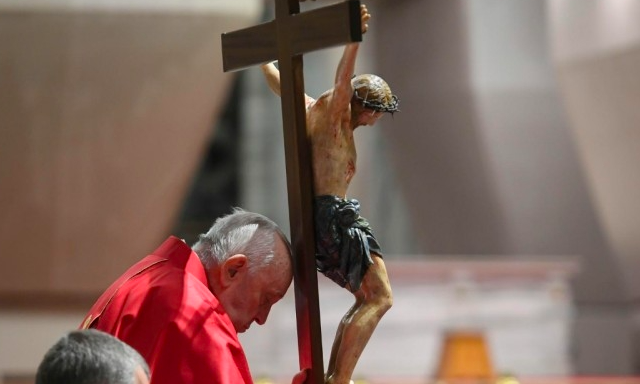The Pope witnessed only half of the celebrations proper to Good Friday. The Pope presided over the celebration of the Passion of the Lord in St. Peter's Basilica, but minutes before the beginning of the Stations of the Cross in the Colosseum, the Holy See Press Office announced that the Pope would follow the prayer from his house in Santa Marta. This year, the meditations for the Stations of the Cross have been written by the Pope himself.
A Via Crucis of the Pope without the Pope
"In prayer with Jesus on the Way of the Cross", This is how Francis has entitled these meditations that accompanied the prayer of the 14 Stations of the Cross, which Francis, for health reasons, was unable to attend. The text is rooted, in a direct way, with the celebration of the Year of Prayer the Catholic Church in preparation for the Jubilee of 2025.
Lay people, young people, nuns and priests have been the bearers of the cross, with whom the hundreds of attendees have prayed this Via Crucis, touring the interior of one of the places of martyrdom of the Christians of the first hour.
The Pope's meditations began with a plea for forgiveness to Jesus for our lack of dedication to prayer, which leads to a superficiality of life: "I realize that I hardly know you because I know little of your silence, because in the frenzy of hurry and busyness, absorbed by things, trapped by the fear of not staying afloat or by the desire to always put myself at the center, I do not find the time to stop and stay with you".
Francis also wanted to focus on selfishness and self-centeredness, so typical of today's society, that instead of going to God "I close myself in on myself, mentally ruminating, digging into the past, complaining, sinking into victimhood, a champion of negativity".
The figure of the Virgin Mary and her sorrowful and maternal presence in the Passion of Christ led the Pope to recall that "the gaze of one's own mother is the gaze of memory, which cements us in the good. We cannot do without a mother who gives birth to us, but neither can we do without a mother who puts us in charge in the world" and to look at women, who are so often mistreated in this world.
Francis also wanted to focus on the weaknesses of our lives that we must turn into opportunities for conversion, like the Cyrenean whose weakness "changed his life and one day he would realize that he had helped his Savior, that he had been redeemed through the cross he carried"; falls that, lived at the Lord's side, "hope never ends, and after every fall we get up again, because when I make mistakes you do not tire of me, but you draw closer to me".
This Way of the Cross 2024, the twelfth to be celebrated under the pontificate of Pope Francis, is marked by the celebration of the year dedicated to prayer in the Church. For this reason, there have been continuous references to Christian prayer. The Pope asked "Jesus, may I pray not only for myself and my loved ones, but also for those who do not love me and do me harm; may I pray according to the desires of your heart, for those who are far from you; making reparation and interceding on behalf of those who, ignoring you, do not know the joy of loving you and of being forgiven by you". and insisted on the "unheard of power of prayer" and the need to persevere in it.
Celebration of the Lord's death
Previously, the Pope had presided over the celebration of the Passion of the Lord in St. Peter's Basilica. Cardinal Raniero Cantalamessa, O.F.M. Cap., preacher of the Papal Household, gave the homily at the celebration, which was attended by more than 4,000 faithful, together with dozens of priests, bishops and consecrated persons.
Cantalamessa wanted to emphasize the "I am" of Christ, which shows that "Jesus did not come to improve and perfect the idea that men have of God, but, in a certain sense, to invert it and reveal the true face of God".
The preacher of the pontifical house also emphasized how God "stops" in the face of human freedom: "God is devoid of all ability, not only coercive but also defensive, in the face of human creatures. He cannot intervene with authority to impose himself on them".
The triumph of Christ, Cantalamessa continued, "takes place in mystery, without witnesses. Jesus appears only to a few disciples, out of the spotlight. They tell us that, after having suffered, we should not expect an external and visible triumph, like earthly glory. The triumph is given in the invisible and is of an infinitely superior order because it is eternal".
The Pope, visibly tired, continued the celebration of Good Friday with the adoration of the Cross and communion. A liturgy marked by silence and recollection.









